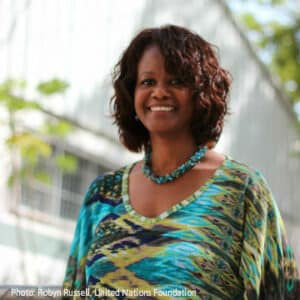Better Work, a collaboration between the International Finance Cooperation (IFC) and the ILO, has joined forces with an innovative foundation to improve factory clinics and boost the quality of life for a group of deaf workers in Haiti
20 February 2017.

Geneva – Share Hope is a unique social enterprise that is part foundation and part for-profit business operating in Haiti. The foundation works within garment factories to improve the well-being of factory workers while the business supplies retailers with value-added apparel, ensuring that the products are made with, in their own words, “the highest level of social and corporate responsibility”.
In this interview Cynthia Petterson, CEO and founder of Share Hope, explains how her organization and Better Work have been collaborating with on health and worker welfare programmes in Haiti, using funding and support from the Levi Strauss Foundation.
How did the relationship between Better Work and Share Hope develop?
We have quite a strong working relationship with Better Work Haiti. Often we were in factories at the same time as Better Work and we noted that the synergies were quite significant and so just began to informally walk side by side on issues that would arise and where our input could be valuable.
In 2013 Levi’s, through their work with Business for Social Responsibility (BSR), asked if Better Work would be interested in implementing the HERhealth training programme in the factories they advised. At that point Better Work came to us and asked if we might collaborate with them on the implementation.
Why did you focus on factory clinics as a next step?
While implementing the HERhealth programme in several factories we were thinking about sustainability – how to make sure the lessons learned are passed on. Early on we realised that factory nurses are, in general, an underutilised resource. Labour law in Haiti requires that there is one nurse per 200 workers, however many owners struggle to reach this number, partly because neither they, or the workers, or the nurses themselves had much faith in the system. They often acknowledged that the clinic staff “spent a good part of the day sleeping”.
So, we put together a programme to train the nurses using training techniques we had in place. Our aim was to train them with higher levels of technical knowledge and our curriculum developer, on trips to Haiti, would hold rather intensive training for several hours on each specific module. Through this process we identified that their education was weak that their knowledge was inaccurate, in many cases.
After a year what improvements have you seen?
I would say it’s early days but we have noted that the clinics look more professional and we have seen improved hygiene in the clinics. The clinics are using a standardised patient intake directory. We worked on building the relationship between visiting doctors and the nurses.
Ultimately for us, our raison d’etre is to improve workers lives, and so to that end we held focus groups over the last two months, right up until January this year, to ask for their impressions. What workers told us in those meetings was that they liked the way the clinics now looked, they like the more professional approach of the nurses and overall they felt that the nurses were much stronger advocates for their health. The nurses themselves have seen their own morale increase dramatically, they feel much more respected and appreciated.
In another project you have targeted a specific group of deaf workers that are based in one of the factories. What programme have you put in place for them?
When we began the HERhealth training in 2014 we immediately noticed one of the factories had an unusual population of 48 to 50 deaf workers. For us equal access is equal access, so we had to address the challenge of how to communicate with and train these workers. This lead to the first deaf Peer Educators globally. We subsequently connected this group of workers with the Starkey Foundation. This organization was in Haiti fitting hearing aids for the deaf community. After this group of workers received their hearing aids it became apparent that some were also regaining the ability to make recognizable sounds. This further lead to us develop communication classes that included literacy, sign language and speech pathology. Two deaf workers are currently working with a speech pathologist.
What kind of challenges does this group face at work and in the community?
The deaf in Haiti have been a marginalised group. We conducted an intake survey of those entering this programme and the stories they told us were rather heart-breaking. We asked them why do you want to improve your communication and people would say things “so my family will beat me less” or that people would “care more for them”. It has been a very special engagement and it’s a very special community. I don’t know of any other examples where a group like this is getting attention and support in the countries where Better Work is working. We are very proud to be able to advocate for them and offer them equal access to our programmes and work.